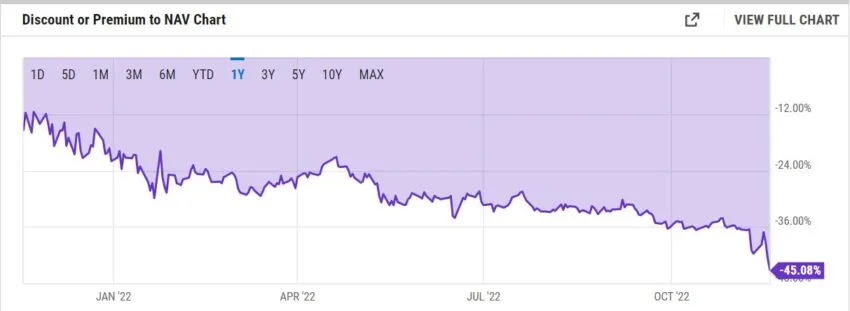In light of the recent FTX collapse, skepticism towards all centralized entities has rapidly ramped up. To counter some of the mistrust, most crypto exchanges have started publishing "proof of reserves" - publicly verifiable information on their holdings. Just one of the crypto behemoths, Grayscale Investments, has refused to do so.
Concerns about a potential Grayscale shortfall have grown after the digital asset product issuer refused to publish its proof of reserves. A Twitter thread by the investment firm failed to douse rousing fears, citing security risks as to why it couldn’t publish its wallets. Slightly concerning, as the Grayscale Bitcoin Trust (GBTC) manages over $10bn in bitcoin - 3% of the entire supply.
The fears of Grayscale being in trouble first surfaced after Genesis Trading announced that it was suspending the origination and redemption of loans. Given that Digital Currency Group (DCG) owns both Grayscale and Genesis, concerns about its financial health have begun to grow. The crypto community speculated how this could affect Grayscale and its major product, GBTC. Reports that Genesis failed to raise $1 billion before halting withdrawals also fanned the flames.
Grayscale refuses to publish proof of reserves
According to Grayscale’s Twitter thread, the product issuer sets up a legal entity for each product. They claim that the US-based regulations surrounding its digital asset products prevent the underlying assets from being sold. The firm added that all the assets are custodied at Coinbase Custody Trust Company. The underlying BTC for the GBTC product solely belongs to the Trust and not to Grayscale or its parent company DCG.
2) Each of Grayscale’s digital asset products is set up as a separate legal entity: an investment trust for single asset products, and limited liability company for diversified products.
— Grayscale (@Grayscale) November 18, 2022
But due to some security concerns, they don't want to do make on-chain wallet information and confirmation information publicly available through a cryptographic proof of reserve - or other advanced cryptographic accounting procedures. This stands in stark contrast to crypto exchanges like Binance, Huobi, and Crypto.com, that have already published their proof of reserves to win community trust. Although it is worth noting that none of them have revealed their liabilites, which would be required to get a full overview of an exchange's health.
GBTC discount growing deeper
According to available data, GBTC is currently trading at a discount of 45% to the net asset value (NAV). This represents a record low, partly because parent company DCG is currently facing fears of financial distress. The discount arises from the one-way issuance parth that the Trust takes. Even though spot bitcoin can be converted to GBTC 1:1, it is impossible to redeem GBTC for spot BTC. So until the SEC approves a spot-based bitcoin ETF, investors are stuck in GBTC.

In addition to the already dire situation for GBTC, some of the once largest holders such as Three Arrows Capital (3AC), BlockFi, and Alameda Research have been forced to liquidate their investments due to bankruptcy proceedings. It is worth noting that this has forced DCG to buy back up to $750mn worth of GBTC shares with its own capital. While that has not mitigated the GBTC discount, it now means that DCG could be facing a liquidity crunch. Especially with rumors circulating that Digital Currency Group has lost over $2bn with Genesis - $1.2bn after the 3AC insolvency, and another $1bn after the FTX/Alameda debacle.




